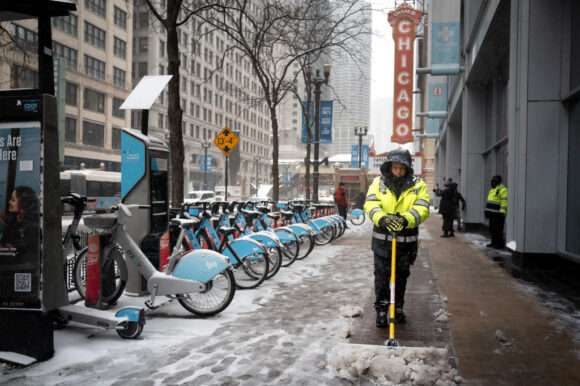Heavy snow will drop on Chicago late Sunday into Monday’s commute, further snarling air travel already disrupted by the US government shutdown and ushering in a cold blast that will bring near-freezing temperatures to New York City and as deep as Florida and Texas.
A winter storm warning is posted for the southern end of Lake Michigan, including Chicago, where as much as 12 inches (30 centimeters) may fall overnight into Monday morning, the US National Weather Service said. Parts of nearby northern Indiana may receive as much as 18 inches.
The lake-effect snow will also come with thunderstorms and will be pushing wind gusts in excess of 30 miles (48 kilometers) per hour.
“Snow rate in excess of 3 inches per hour will cripple travel, including during the Monday morning commute,” the weather service in Chicago said. “Persons should consider delaying all travel while and where lake effect snow is ongoing.”
Heavy snow in Chicago can disrupt air travel across the US and set off a chain reaction of cancellations and delays in a system already taxed by flights being scrubbed due to the shutdown. Through late Sunday afternoon, 2,198 flights in and around the US had been cut, with another 7,253 delayed, according to FlightAware, an airline tracking service. With the threat of heavy snow and cold those numbers will likely climb.
There were already 875 flights canceled in the US for Monday, with 126 out of Chicago’s O’Hare International Airport.
Toronto, Canada’s most populous city, is forecast to get more than 4 inches, according to Environment and Climate Chance Canada.
Snow had already started in Chicago on Sunday and will become more intense overnight, said Brian Hurley, a senior branch forecaster at the US Weather Prediction Center.
The snow in Chicago is part of a larger sweep of cold air across the central, southern and eastern US that will send temperatures to 32F (0C) in New York’s Central Park Monday night and even colder across the south.
As many as 38 low temperature records may be tied or broken across the South, including in Florida and Georgia, Monday and Tuesday, Hurley said. The cold will seep into New York and the Northeast to start the work week as well, before quickly exiting and returning temperatures to more mild conditions.
The cold is mainly caused by frigid temperatures dropping down from Canada and then being bottled up for a few days by a blocking pattern over Greenland, Hurley said. The chill won’t last long in most places.
“For everyone in the east, it is going to wake us up,” Hurley said. “For the Southeast, that is where the records are.”
Was this article valuable?
Here are more articles you may enjoy.



 A 10-Year Wait for Autonomous Vehicles to Impact Insurers, Says Fitch
A 10-Year Wait for Autonomous Vehicles to Impact Insurers, Says Fitch  Florida Insurance Costs 14.5% Lower Than Without Reforms, Report Finds
Florida Insurance Costs 14.5% Lower Than Without Reforms, Report Finds  What Analysts Are Saying About the 2026 P/C Insurance Market
What Analysts Are Saying About the 2026 P/C Insurance Market  Insurify Starts App With ChatGPT to Allow Consumers to Shop for Insurance
Insurify Starts App With ChatGPT to Allow Consumers to Shop for Insurance 

